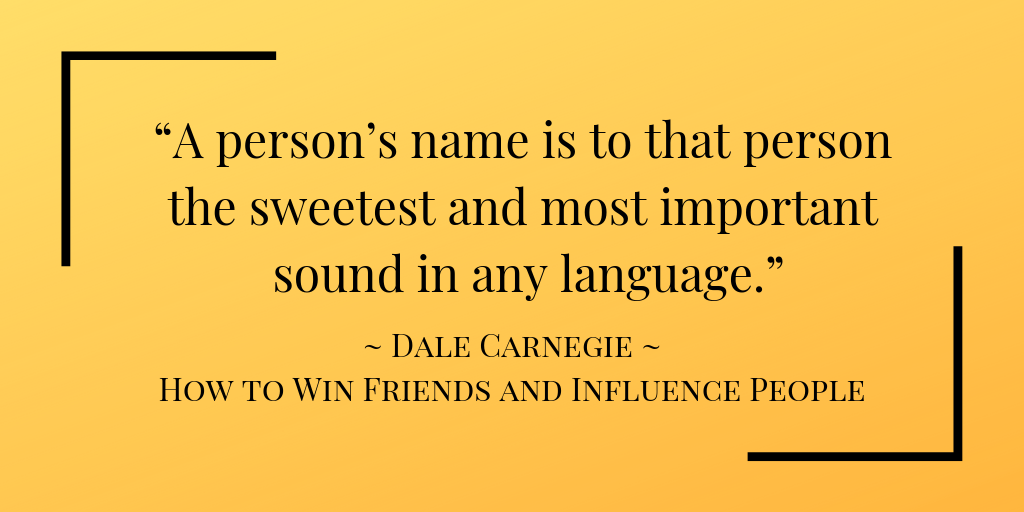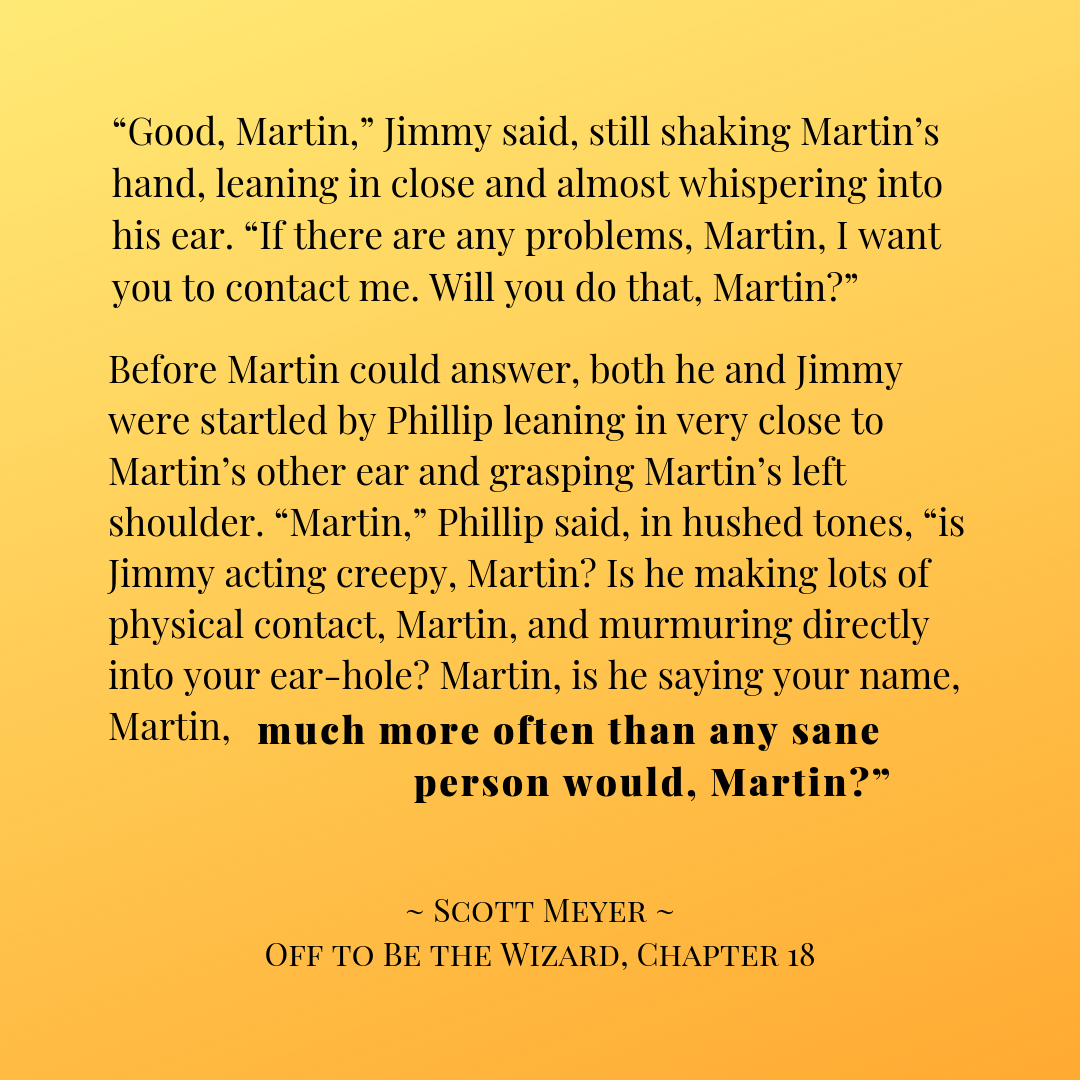Our exploration of literary Barrier Objects continues with overuse of the vocative case.
Vocative (VOC): the grammatical case that marks the person or thing being spoken to
e.g., “Hey, Mom, what’s for dinner?”
In terms of syntax, the vocative case is a rhetorical element. It happens outside the main structure of the sentence, and its use doesn’t change the meaning of what is being said, except to direct it to a specific listener. It will usually occur either at the start or the end of a sentence, or it can interject alongside other rhetorical elements.
- “Carol, I need your report by 5 o’clock.”
- “I haven’t seen you in ages, John.”
- “If you need me, Sam, I’ll be in my room.” (“if you need me” = dependent conditional clause)
- “If, Sam, you need me, I’ll be in my room.” (“if” = complementizer)
The more intrusive the vocative insert, the more marked it becomes. So, example #4 above would only occur if the speaker is making a special point to their listener. (And really, I imagine someone using that type of insert to go a little overboard: “If, my dear Sam, you need me, I’ll be in my room.” Sounds a bit threatening, haha.)
In everyday speech patterns, we use the vocative case in two primary situations:
- When we’re trying to get someone’s attention.
- When we’re trying to establish emotional connections.
We don’t actually say people’s names all that often when we’re talking directly to them. In fact, we can meet and openly interact with someone several times without ever exchanging names, depending on the circumstances. Shallow acquaintance requires no further investment that the pleasantries of light conversation. Only when you want to delve into a deeper relationship (friendly or otherwise) does it become necessary to put a name with a face.
This applies for writing as well as real-life situations. Authors don’t typically waste mental capital naming background characters, and if they do, their readers probably won’t retain such an insignificant detail anyway.
A Case for the Vocative?

In his pivotal handbook for how to creep people out be socially savvy, Dale Carnegie encourages use of the vocative. More specifically, he encourages people to use one another’s names (which isn’t a bad thing), and the vocative case is the easiest way to do that. People like to hear their own names. It makes them feel happy, loved, important, etc.…
Except that frequent use ends up feeling canned, as though someone read a self-help book and is trying too hard to show you They Care™.
*cough* (Because that’s what Carnegie teaches.)
If you say my name multiple times in a conversation, I will peg you as an awkward or manipulative conversant and minimize any further contact. But then, I adhere more to a reverse philosophy: “That’s my name; don’t wear it out.”
In his novel, Off to Be the Wizard, Scott Meyer comically illustrates the vocative ad absurdum:
Jimmy, we can imagine, was a Dale Carnegie acolyte. Phillip, on the other hand, was not. And Martin, stuck in the middle, gets the fun effect of not only a charlatan trying to schmooze him, but a cynic pointing it out for all to see.
Vocative Case in Fiction
Overuse of the vocative case shows up in writing when we’re trying to create emotional connections between characters. Imagine a page of dialogue where two people pour out their souls to one another. It’s sentimental, it’s vulnerable…
It’s got them saying each other’s name every other line, to the point of distraction. The names become a ridiculous tattoo, and the scene loses all its emotional potency.
Why? The answer is simple.
Even if you agree with Carnegie, even if you like the sound of your own name and have characters who also like the sound of their own names, remember: everything in a novel acts as a dialogue between Narrator and Reader.
It’s not your reader’s name you’re repeating. The repetition will not have the same emotional effect upon them as their own name would.
In an attempt to establish emotional connections, the vocative case can actually drive a wedge between the reader and the narrative. It’s not something to eliminate entirely, of course, but beware of overuse.
***
Up next: Excessive, Expressive Dialogue Tags
Previous: 3rd Observational POV
Back to Liar, Liar Navigation Page

Interestingly enough, in Korean, either the person’s name (or a similar word “Unni/Oppa/etc) is used as much or even a tad more than “you/your”.
Apart from feeling at first that it was awkward and unusual, I actually like hearing my name called. I’m not used to my name being used to me (in my family, I’m usually called by a nickname if at all; and when I was married I almost never heard myself called by name) and it’s sweet to me.
So when someone starts a sentence with “웬디는…” it’s really nice.
But when someone uses it too much while they’re trying to sell me something–or when someone I don’t know from a bar of soap deliberately uses it at my dayjob–I hate it with the burning passion of a thousand suns.
I love that insight into Korean! There’s definitely cultural and politeness dynamics at work with personal name use, and that is a prime example. Thanks for sharing!
It’s disingenuousness, as you so aptly expressed, that really chafes. No one I know of likes forced familiarity.
Ha! And I have to force myself to add names because it gets too open ended sometimes. I can see the whole thing in my head, but no one else can. and I like Gringell’s “bar of soap” comment. Totally stealing that and seeing if anyone gives me a double take when I use it in casual conversation.
Haha, it must be an Aussie thing! I wasn’t sure 😀 I’m constantly finding out that a lot of the things I say are Australianisms and not widely known…
See, living in California means that most of our slang ends up in a movie at some point. Although, I have older parents, so I tend to use words and phrases that make people look at me like I’m nuts. Like ‘persnickety’. Such a fun word!
“persnickety” is a WONDERFUL word 😀
When I first started writing, I shied from using my characters’ names so severely that I had a list of 3-4 epithets I’d use for each of them instead. I had to train myself to use names, and then the pendulum swung too far and I had to pull it back the other way. It’s a constant battle for me.
Comments are closed.